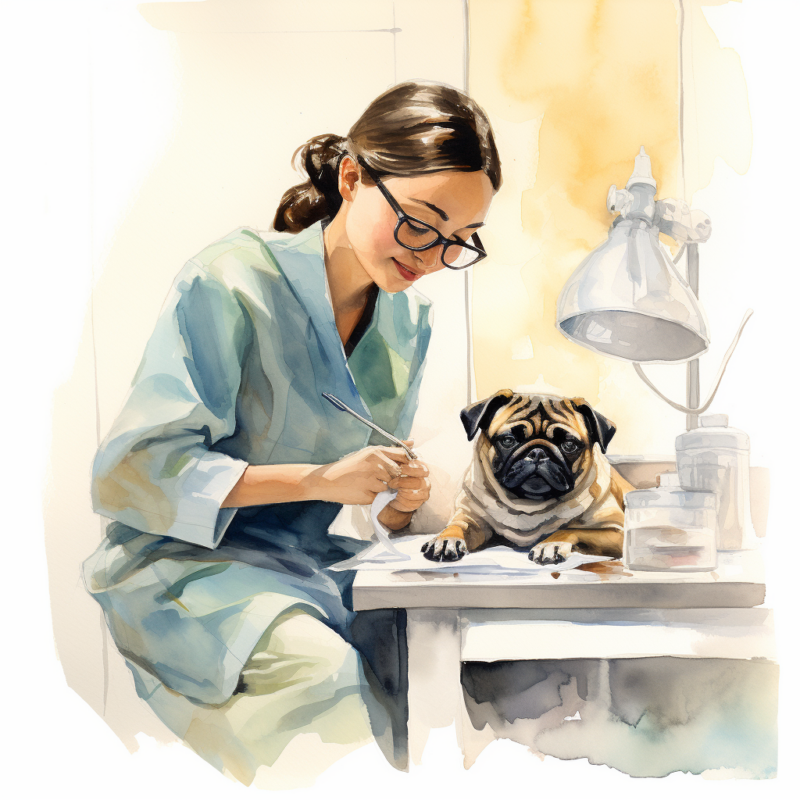Respiratory Diseases in Dogs: Causes, Symptoms, Treatment
What is it?
How is it Treated?
Breed Predispositions
Bulldogs Chihuahuas Yorkshire Terriers Pomeranians Labrador Retrievers Cavalier King Charles Spaniels
As pet owners, we want to provide the best possible care for our furry friends, but sometimes they can fall ill with respiratory diseases that can be challenging to manage. One day, a pet owner named Sarah noticed that her beloved French Bulldog, Max, was showing signs of coughing, sneezing, and difficulty breathing. After taking Max to the veterinarian, it was discovered that he had a respiratory disease that was affecting his lung function.
Respiratory diseases in dogs comprise an array of disorders impacting the components of the respiratory system, which is vital for proper breathing and overall well-being. This system allows for exchanging oxygen and carbon dioxide, making it essential for a dog’s health. As a result, a dog suffering from respiratory diseases, such as canine infectious respiratory disease complex, can experience significant impairment in their ability to breathe, exercise, or participate in daily activities.
These conditions can range from mild to severe, and their management depends on the specific respiratory disease present. Acute respiratory issues may affect many dogs, regardless of their breeds, and can even impact the lung lobes. Therefore, understanding the importance of the respiratory system and its role in a dog’s health is crucial for any pet owner.
Types of Upper Respiratory Infections
- Canine Infectious Tracheobronchitis (Kennel Cough): This is a highly contagious respiratory disease caused by a combination of bacteria (Bordetella bronchiseptica) and viruses (canine parainfluenza, canine adenovirus type 2). It mainly affects the trachea and bronchi, leading to a dry, hacking cough. The initial findings on influenza in dogs linked to the H3N8 infection paint a grim picture of a rapidly spreading respiratory illness, with a shockingly high rate of disease among affected pups, ranging from 60-80%, and thankfully low mortality rates at only 1-5%.
- Canine Influenza: This is a viral infection caused by the canine influenza virus (H3N8 or H3N2) that leads to symptoms like coughing, sneezing, nasal discharge, and fever.

- Brachycephalic Airway Syndrome: This condition affects brachycephalic breeds (dogs with short muzzles) like Pugs, Bulldogs, and Boxers, causing them to have difficulties breathing due to structural abnormalities in their upper airway.
Types of Lower Respiratory Tract Diseases
- Canine Pneumonia: This is an infection of the lungs caused by bacteria, viruses, fungi, or parasites. Symptoms include coughing, fever, difficulty breathing, and lethargy.
- Canine Bronchitis: This is the inflammation of the bronchi, which infections, allergies, or irritants can cause. Symptoms include a persistent cough, wheezing, and difficulty breathing.
- Canine Asthma (Allergic Bronchitis): This is an allergic reaction causing airway inflammation, leading to coughing, wheezing, and difficulty breathing.
- Canine Pulmonary Fibrosis: This progressive disease affects the lung tissue, causing scarring and thickening, leading to difficulty breathing and reduced oxygen exchange.
- Canine Heartworm Disease: This parasitic infection can cause damage to the lungs and the heart, leading to coughing, difficulty breathing, and exercise intolerance.
Causes of Canine Respiratory Problems
There are numerous causes of respiratory diseases in dogs, affecting various respiratory system components, such as the nasal passages, trachea, bronchi, and lungs. However, dog owners should be aware of the common causes, which include:
- Infections: Viral, bacterial, and fungal infections can lead to respiratory issues in dogs. Common infectious agents include canine distemper virus, Bordetella bronchiseptica, canine influenza virus, canine respiratory coronavirus, and Aspergillus fungus.
- Allergies: Dogs can develop respiratory symptoms due to allergic reactions to environmental allergens, such as pollen, mold spores, dust mites, and cigarette smoke.
- Foreign bodies: Inhaled objects like grass seeds or small toys can become lodged in the airways, causing irritation, inflammation, and difficulty breathing.
- Parasites: Certain parasites, like lung and heartworms, can infest the respiratory system and cause breathing difficulties.
- Anatomical abnormalities: Some dog breeds, especially brachycephalic breeds like Pugs and Bulldogs, are predisposed to airway disease and respiratory dysfunction due to their shortened nasal passages and compressed airways.
- Chronic respiratory conditions: Chronic bronchitis, asthma, or collapsing trachea can lead to ongoing respiratory issues in dogs.
- Tumors: Growths in the respiratory tract or lungs can obstruct airflow and impair breathing.
- Trauma: Injuries to the chest or airways, such as those caused by car accidents, can result in respiratory problems.
- Environmental factors: Exposure to irritants like smoke, chemicals, or poor air quality can cause or exacerbate respiratory issues in dogs. Dogs with severe respiratory problems should avoid high-risk areas such as dog parks, boarding facilities, or places with multiple dogs.
Symptoms of Canine Respiratory Infection
The symptoms of respiratory diseases in dogs can vary depending on the underlying cause, the severity of the condition, and the specific part of the affected respiratory tract. However, clinical signs of illness may indicate a respiratory problem in your dog. Some common symptoms include:
- Coughing: A persistent or severe cough can indicate various respiratory issues, such as kennel cough, bronchitis, or pneumonia. The cough may be dry and hacking or produce mucus or phlegm, affecting the respiratory tract.
- Nasal discharge: Discharge from the nose may be clear, thick, or colored, indicating anything from a simple cold to a more severe infection or inflammation, such as a lung infection.
- Difficulty breathing: Labored or rapid breathing, or dyspnea, can indicate respiratory distress. Dogs may also exhibit open-mouthed breathing or wheezing, which can be signs of pneumonia or other respiratory diseases.
- Sneezing: Frequent sneezing can indicate irritation or inflammation in the nasal passages or sinuses, which may be due to allergies or infections affecting the respiratory tract.
- Loss of appetite: Respiratory distress can make eating difficult for dogs, resulting in weight loss and decreased energy levels. Animals may struggle to consume food when experiencing respiratory signs.
- Lethargy: Dogs experiencing respiratory issues may become less active and appear fatigued due to decreased oxygen levels, indicating that the disease may progress.
- Bluish or pale gums: This can indicate the dog is not getting enough oxygen, a severe symptom requiring immediate veterinary attention. Dogs with pneumonia or other severe respiratory issues may exhibit this symptom.
Diagnosis of Respiratory Problems in Dogs
Diagnosing respiratory disease in dogs requires a comprehensive approach to identify the underlying cause and determine the appropriate treatment accurately. When you bring your dog to the veterinarian with respiratory symptoms, the following steps may be taken:

- History and physical examination: The veterinarian will first ask about your dog’s medical history, including any previous health issues, vaccination status, and the onset and progression of the current symptoms. A thorough physical examination will be performed, with particular attention given to the respiratory system, including listening to the dog’s breathing and heart rate with a stethoscope.
- Blood tests: Blood samples may be taken to assess the dog’s overall health, check for signs of infection or secondary infection, and evaluate organ function. A complete blood count (CBC) and blood chemistry panel are standard tests that can provide valuable information about your dog’s health.
- Radiographs (X-rays): Chest X-rays are often used to visualize the lungs, trachea, pulmonary parenchyma, and surrounding structures. This can help identify abnormalities such as pneumonia, bronchitis, tumors, or foreign bodies causing pulmonary disease.
- Respiratory tests: Depending on the suspected cause, which could involve viral and bacterial pathogens, the veterinarian may perform additional respiratory tests, such as a bronchoscopy (using a small camera to examine the airways), tracheal wash (collecting fluid from the trachea for analysis), or a fine needle aspirate (collecting a sample of lung tissue for examination).
- Other diagnostic tests: In some cases, further tests may be needed to pinpoint the cause of your dog’s respiratory symptoms, especially if the dog has been diagnosed with a highly contagious upper respiratory or lower respiratory infection. These tests could include a CT scan, MRI, or specific tests for infectious agents such as viruses, bacteria, or parasites.
Treatment for Respiratory Infectious Disease in Dogs
Treatments for respiratory diseases in dogs depend on the specific condition and its underlying cause. Here is a general overview of treatments for some common respiratory diseases affecting the upper and lower respiratory system in dogs:
Canine Infectious Tracheobronchitis (Kennel Cough)
- Antibiotics: If a bacterial infection occurs, your veterinarian may prescribe antibiotic treatment such as doxycycline or amoxicillin.
- Cough suppressants: These medications can help alleviate coughing and make your dog more comfortable.
- Rest and hydration: Ensure your dog gets plenty of rest and has access to fresh water.
Canine Influenza
- Supportive care: Fluid therapy, rest, and proper nutrition can help your dog recover.
- Antiviral medications: In some cases, antiviral drugs like oseltamivir may be prescribed.
- Antibiotics: Your veterinarian may prescribe antibiotics if a secondary bacterial infection is present.
- Vaccination: Vaccines are available for canine influenza and can help prevent future infections.
Brachycephalic Airway Syndrome
- Weight management: Keeping your dog at a healthy weight can alleviate some symptoms.
- Medical management: Medications like corticosteroids, bronchodilators, or oxygen therapy may be used to manage symptoms.
- Surgery: In severe cases, surgical intervention may be necessary to correct structural abnormalities.
Canine Pneumonia
- Antibiotics or antifungal medications: Depending on the cause of pneumonia, your veterinarian may prescribe the appropriate medication to treat the infection.
- Fluid therapy: Intravenous fluids may be necessary to help maintain hydration and electrolyte balance.
- Oxygen therapy: Supplemental oxygen can be provided if your dog has difficulty breathing.
- Rest and nutrition: Ensure your dog gets plenty of rest and has access to high-quality, easily digestible food.
Canine Bronchitis and Asthma
- Bronchodilators: These medications help relax and open the airways, making breathing easier for dogs with chronic respiratory issues.
- Corticosteroids: These drugs help reduce inflammation in the airways.
- Environmental control: Minimizing exposure to allergens and irritants is crucial in managing these conditions.
- Weight management: Keeping your dog at a healthy weight can help reduce symptoms.
Canine Pulmonary Fibrosis
- Corticosteroids: These medications can help reduce inflammation and slow fibrosis progression.
- Bronchodilators: These drugs help relax and open the airways, making breathing easier for your dog.
- Oxygen therapy: Supplemental oxygen may be necessary if your dog has difficulty breathing.
- Management of underlying conditions: If another condition contributes to the fibrosis, it should be treated appropriately.
Canine Heartworm Disease
- Anti-parasitic medications: Drugs like melarsomine are used to kill adult heartworms.
- Preventive medication: Monthly heart-worm preventives can help protect your dog from future infections.
- Supportive care: Additional treatments like anti-inflammatory drugs, diuretics, and oxygen therapy may be necessary to manage symptoms and complications.
In some cases, such as lung tumours, treatment options are limited, and veterinary emergency centers or critical care treatment centers may be required to provide specialized care for the lungs of dogs. Therefore, it is essential to consult with your veterinarian to discuss the best course of action for your dog’s specific respiratory disease.
Canine Prevention for Respiratory Disease
Preventing respiratory diseases in dogs involves a combination of proper care, good hygiene, and regular veterinary checkups. One of the most effective ways to protect your dog from respiratory infections is by keeping their vaccinations up-to-date. Vaccines provide immunity against many common infectious agents, including canine distemper, parainfluenza, and canine adenovirus type 2, which can all contribute to respiratory disease. In addition, regular deworming can help prevent parasitic infections that may cause lung problems.
Maintaining a clean and healthy environment for your dog is also essential in preventing respiratory diseases. This is particularly important when dogs are kept in close quarters, such as boarding facilities or dog parks. This includes regularly cleaning and disinfecting your dog’s living area, food and water dishes, and toys and providing proper ventilation in their living spaces. Furthermore, minimizing exposure to environmental irritants, such as cigarette smoke, chemical fumes, and allergens, can also help protect your dog’s respiratory health.
Regular grooming can help remove allergens and irritants from your dog’s coat, benefiting dogs and cats sharing a living space. In addition, maintaining a healthy diet and exercise routine can boost their immune system, making them more resistant to infections. At 13 weeks old, most puppies (around 95%) can produce an effective immune response.
Schedule regular veterinary checkups and promptly address any health concerns, as early detection and treatment of respiratory issues can significantly improve your dog’s prognosis and quality of life. If your dog has been diagnosed with a contagious respiratory disease, keep your infected dog away from other dogs to help manage the disease and prevent its spread. This is particularly important for dogs with mild symptoms, as they may still be contagious to others.
Frequently Asked Questions
Disclaimer: The information provided on this veterinary website is intended for general educational purposes only and should not be considered as a substitute for professional veterinary advice, diagnosis, or treatment. Always consult a licensed veterinarian for any concerns or questions regarding the health and well-being of your pet. This website does not claim to cover every possible situation or provide exhaustive knowledge on the subjects presented. The owners and contributors of this website are not responsible for any harm or loss that may result from the use or misuse of the information provided herein.







